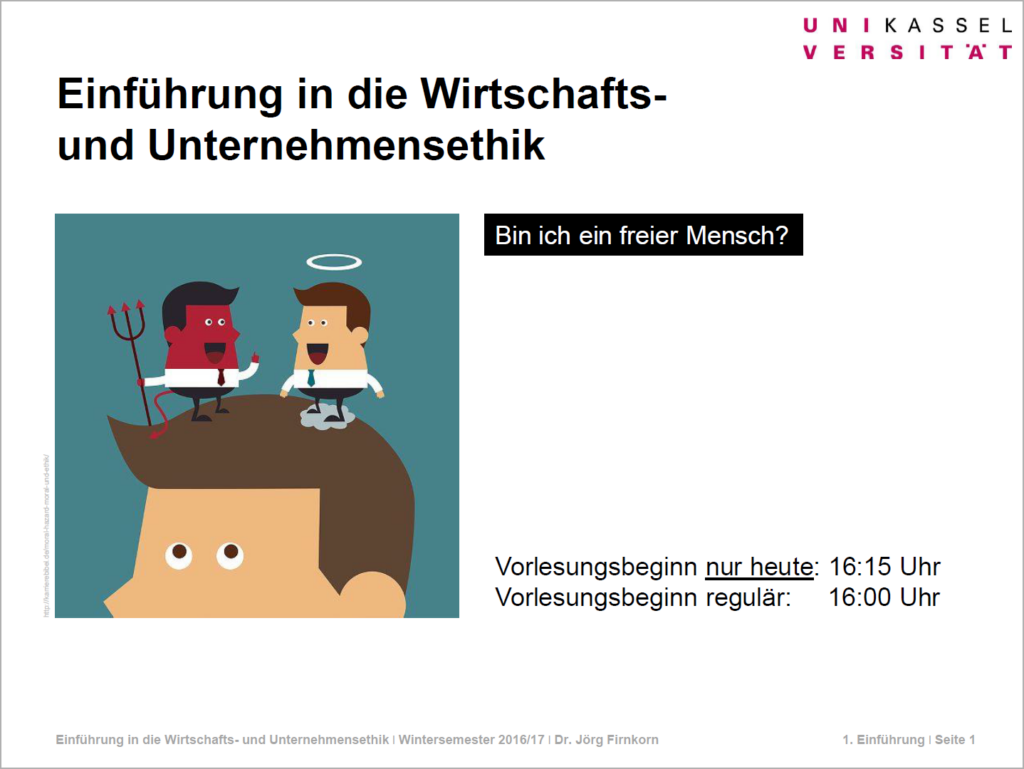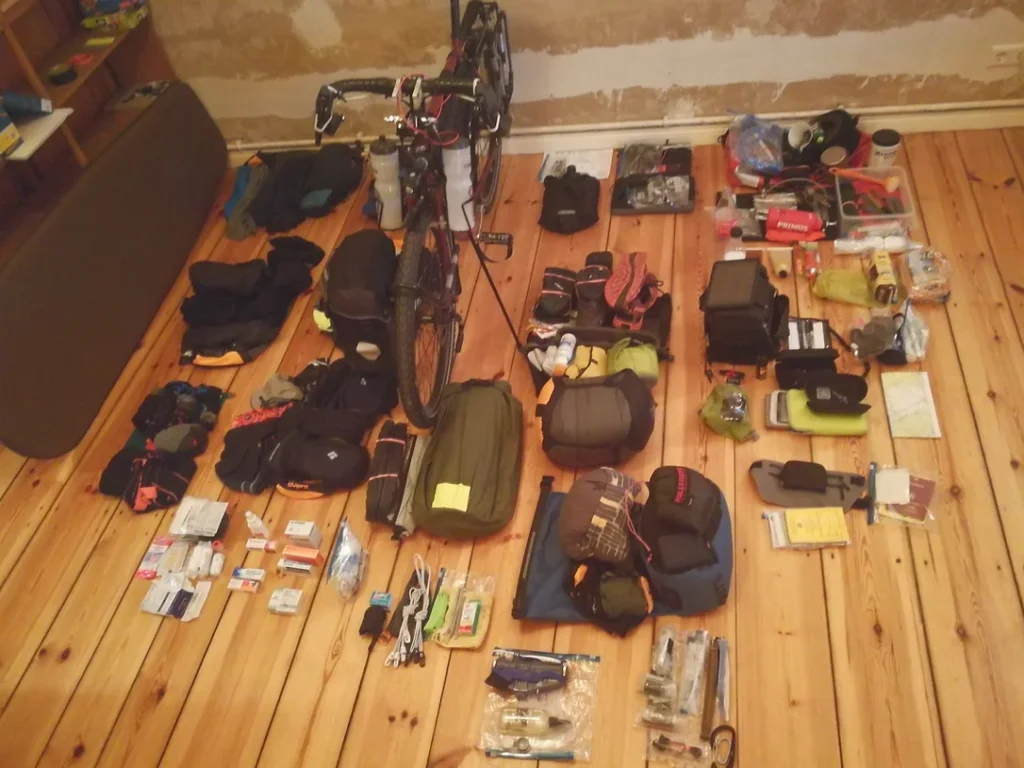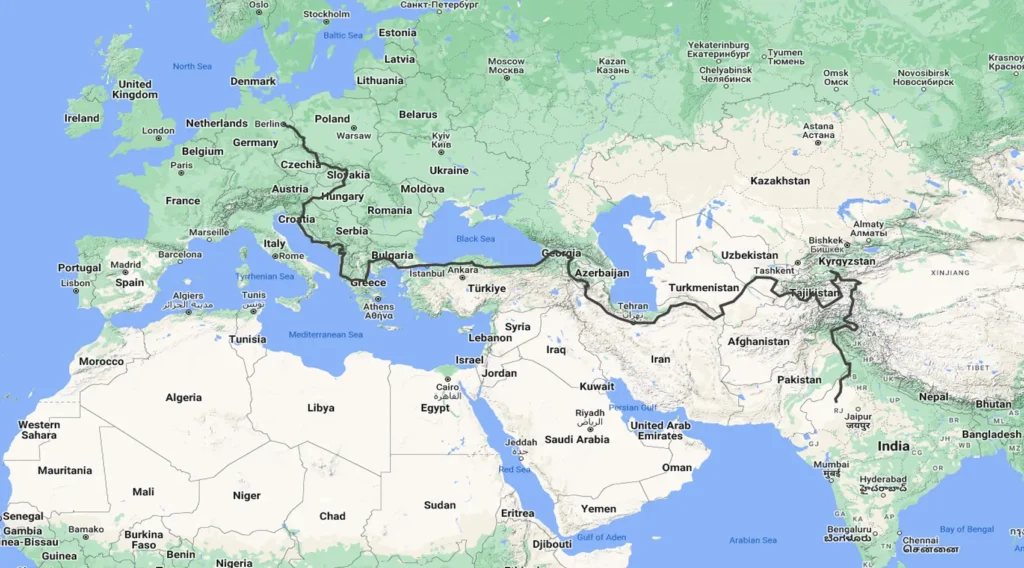Before
How can ethics be taught well?
As the new guest professor for business ethics at the University of Kassel, I was committed to teaching ethics well to my students. My definition of “well” was that they learned skills benefiting them in their lives after university.
Ethic scholars fall roughly into three categories: economists, philosophers, and theologians.
As a simplification, economists apply the classic economics toolbox to ethics (e.g. analyzing income distributions as the base of fairness discussions). Philosophers apply their sharp logical thinking to ethics (e.g. defining moral behavior based on Kant’s categorical imperative). And theologians apply values contained in religious scriptures to ethics (e.g. “You shall not steal”).
I decided to take a different teaching approach when designing my ethics course: training my student’s self-reflection together with their ability of interconnected thinking.
I believe that teaching ethics should be less an exercise in telling students what to think but rather it should give them broad impulses stimulating their own thinking. While this logic equally applies to other disciplines, I think the complex field of ethics requires a particularly strong focus on self-reflection and the ability of knowledge transfer. Ethics is a combination of economics, statistics, psychology, sociology, cognitive science, history, politics, and philosophy – to name just some disciplines of major importance.
I knew this teaching approach would be unfamiliar to many students so in order to win them for my pedagogical concept I started my first lecture by discussing empirical studies and articles analyzing the strengths and weaknesses of university graduates. There is a common theme students complain about while at university which is simultaneously a weakness employers miss in new hires: students complain when they just have to repeat absorbed knowledge to pass exams, and employers complain when hired graduates lack the ability to think for themselves. Self-reflexivity and interconnected thinking seem to be universally beneficial skills.
While already 2,400 years ago Greek philosophers like Socrates and Aristotle thought about ethics, economics, and state theory in combination, it was only in the last decades that an own discipline of business ethics has emerged. Factors contributing to this development include our increasingly complex and globally connected economic system (Would Socrates understand it?) and the emergence of new challenges for humanity – such as pollution, natural resource decline, biodiversity loss, global population growth, terrorism, pandemics, and human-induced climate change. In such a complex and dynamically changing world, knowledge is outdated quickly whereas the ability of self-reflection and interconnected thinking stays timely relevant across topics.
Ethics, in my opinion, is primarily a discipline of introspection:
Who am I? Where do my values come from? Which values do I stand up for? Do I have a free will?

I loved the teaching part of my job and the discussions with my students enormously. I realized quickly that my debate-oriented classroom culture was also an opportunity for me to learn from my students and that collectively we trained something valuable: listening to the perspectives and arguments of others with respect.
However, staying in academia also requires publications. Before joining the University of Kassel I had published articles in peer-reviewed journals but I was tired of it and decided to now write a book – a book on ethics.
A book without constraints like word limitations and journal style guidelines. A book where I could express my thinking freely. Also, I wanted to write a book for the general public.
I had a book structure in mind centered around values. My core interest was how values form and how people’s underlying values shape human decision making and actions: Where do our values come from? Do we have fixed core values or do our values change constantly? If our values change, are we aware of this? And more generally, which factors influence how our values get encoded in our individual consciousness?
I planned to write the first book part on the general value-behavior relationship explaining people’s decisions and the second book part on people’s self-reflection regarding their values. With the book I wanted to help people to better understand what their individual values are and thereby enable them to live more authentic – more aligned with their true self … whatever ethical decisions people face in their daily lives.
While this idea initially sounded good in my head, the more I thought about it the more I realized that human consciousness was what I really needed to understand. Values may be a central factor for human decision making but this level of analysis would be too limited in scope.
Therefore I then planned a much expanded book structure on human consciousness but realized quickly that I lacked a core ingredient: something to say.
If you ever decide to write a book on consciousness, know what you are getting into – “consciousness” is a highly elusive topic … good luck (you will need it).
And then, and I’m saying this as a guy who has just invested 8.5 years writing on it, if you do decide to bite your teeth out writing on consciousness, you are going to need time – lots of time. Because basically before you can do any writing you have do a lot of thinking and background reading and all that …
One day in fall 2016 I remembered an idea I had been dreaming about since 15 years and the solution became clear to me: I decided to cycle from Germany to Asia along the Silk Road and work on the book along the way. Like that I would have the required thinking time to deeply explore some ideas on possible patterns within our human consciousness – was my romantic plan … forget about it, when you cycle and wild-camp your day is full (I wrote the book afterwards).
The decision felt right and I started to research route options and to assemble my equipment.
I did a test bicycle tour from Berlin to the Baltic Sea and back to test some equipment. I still took far too much equipment as I learned only on the road to value of focus.
I started in March 2017 and cycled a continuous line from Berlin to India. I planned the tour myself, cycled alone, and mostly wild-camped – often in mountain and desert regions.
I camped in winter conditions in the first months, then in hot deserts between Armenia and Tajikistan, then again in winter conditions in the Himalaya region, then again in the desert in northern India.
Regarding the book idea that started this trip 8.5 years ago, at some point after my return I decided to go for a website and integrate the text with pictures from the road … you are reading it right now.
I failed in many ways in this writing project, including the following:
One thing I realized is that “writing something on consciousness” is definitely tricky: where do you start? where do you stop? which assumptions do you accept as given and which do you question and why?
Sure I did consciousness focused teaching before, sure I had thousands of hours alone in the saddle and in my tent – but on the philosophical side I don’t have something new to say. My mere contribution is an attempt in weaving together some familiar facts into an overall perception of human consciousness.
The 24 chapters focus topics we can “think about” – but these things also exist in our real reality beyond our thinking about them.
The 24 topics are almost chosen arbitrarily … sure we could think about anything else but they seemed plausible candidates in the space of consciousness self-reflection. I selected them based on what I assumed to be things that generalize across people … maybe, who knows.
And regarding the reality-bending force we all already have inside, I kind of realized that trying to describe it in language only gets you so far … it’s seems to be more of a feeling thing.
On the stories-from-the-road side, I realized that I’m not a writer. I had a bumpy start moving from scientific writing towards something like “travelling philosophy”, and I didn’t improve much. I also realized that you can strategize a lot as an author how you want to come across … but in the last rewriting round I decided to just be myself and speak with a voice I would use when we sit by a fire and I tell you a story. It made my writing life definitely easier.
This book has two parallel narrative streams from Berlin to India. First, the stories-from-the-road stream (linear time, cycling/camping, written in past tense, embedded with pictures). Second, the philosophical stream (written in present tense, raising questions people face in daily life)
Sure I was the cyclist in this story but in the philosophical side I keep myself minimal and maintain a neutral ethics perspective – the philosophical stream is not my personal life philosophy, not autobiographical … but of course such demarcation lines are a bit blurry.
If you are interested in the philosophical side, you may as well just read the chapter “After” – the rest is detail.
If you are interested in the stories-from-the-road side, I strongly suggest you skip Chapters 1-6 – the writing in the beginning is weaker, the first real mountains start in Croatia, and in the beginning I was so embarrassingly inexperienced that I could barely hold my balance on the bike.
I don’t really expect anybody to read this full book sequentially – consider it more like an album with music songs where you you dip in a little as you see fit. If you want to read something like two chapters from the road, perhaps take a look at Chapters 18 & 24.
But then again it depends and if you like mountains Albania and Pakistan may be good choices.

